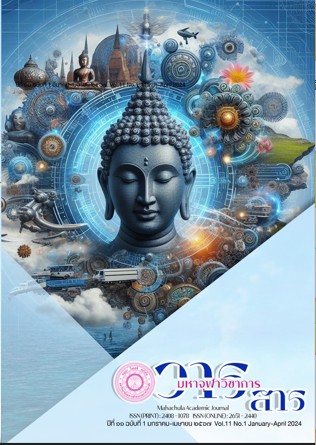Guidelines for The Observance on Pāṇātipāta Precept for Thai Buddhists
Main Article Content
Abstract
In this research, three objectives were purposely made: (1) to study the precept observation on Pāṇātipāta of Thai Buddhists in Theravada Buddhism, (2) to study the criteria for judging the precept observation on Pāṇātipāta in Buddhism, and (3) to present the guidelines for the precept observance on Pāṇātipāta for Thai Buddhists. This research employed a qualitative research methodology done by studying documents and in-depth interviews of ten key informants.
The findings were shown that: Thai Buddhists place great importance on preserving animal lives where animal life redemption activities are organized with the awareness of giving life to animals resulting in self and family longevity. The precept observation on Pānātipāta as well as chanting for loving kindness were expressed to all sentient beings to reaffirm loving kindness to all beings.There are five criteria for judging the observance of the precept : (1) Pāno- living animal, (2) Pānsaññitā- knowing such living beings are alive,3) Vadhakacittam- having volition to kill, (4) Upapakkamo- an attempt to kill, (5) Tena maraṇam- beings die with such attempt. Only if a person kills with all the above five criteria, the Pānātipāta precept is broken. But if the five criteria are not completely violated, the precept is not broken but blemished. Killing animals is more or less demerit with the following three criteria: - (1) animal body size, (2) virtue, (3) attempt. Killing a large animal is a great demerit, killing a small animal is a minor demerit; Killing a virtuous person is a great demerit, killing an unrighteous person is a minor demerit. Killing that takes a lot of effort is a great demerit, killing with little effort is a lesser demerit. As far as the guidelines for the precept observation on Pānātipāta for Thai Buddhists are concerned, they personally need to start with loving kindness, compassion, forgiveness, no harm to humans and to all sentient beings is done; being with hiri is the shame of evil and ottappa is the dread of evil. One must not only kill by himself but also not ask others to kill; cultivating and training Buddhist people to be kind and compassion.
Article Details

This work is licensed under a Creative Commons Attribution-NonCommercial-NoDerivatives 4.0 International License.
References
ประเวศ อินทองปาน. พระพุทธศาสนากับสัตว์. พิมพ์ครั้งที่ ๓. กรุงเทพมหานคร: สำนักพิมพ์มหาวิทยาลัยเกษตรศาสตร์, ๒๕๖๒.
พระธรรมปิฎก (ป. อ. ปยุตฺโต). พจนานุกรมพุทธศาสน์ ฉบับประมวลศัพท์. พิมพ์ครั้งที่ ๑๐. กรุงเทพมหานคร: มหาวิทยาลัยมหาจุฬาลงกรณราชวิทยาลัย, ๒๕๔๖.
พระพรหมคุณาภรณ์ (ป. อ. ปยุตฺโต). “ก้าวไปในบุญ”. วารสาร มก อาวุโสสัมพันธ์. ปีที่ ๙ ฉบับที่ ๔๐ (มีนาคม ๒๕๕๒) : ๑๒.
พระพุทธโฆสะเถระ. คัมภีร์วิสุทธิมรรค. แปลเรียบเรียงโดย สมเด็จพระพุฒาจารย์ (อาจ อาสภมหาเถร). พิมพ์ครั้งที่ ๔. กรุงเทพมหานคร: บริษัทประยูรวงค์พริ้นติ้ง จำกัด, ๒๕๔๖.
พระมหาโพธิวงศาจารย์ (ทองดี สุรเตโช). ศีล ๕ รักษาโลก. กรุงเทพมหานคร: สำนักพิมพ์ธรรมสภาสถาบันบันลือธรรม, ๒๕๕๘.
มหาจุฬาลงกรณราชวิทยาลัย. พระไตรปิฎกภาษาไทย ฉบับมหาจุฬาลงกรณราชวิทยาลัย. กรุงเทพมหานคร: โรงพิมพ์มหาจุฬาลงกรณราชวิทยาลัย, ๒๕๓๙.
______. อรรถกถาภาษาไทย ฉบับมหาจุฬาลงกรณราชวิทยาลัย. กรุงเทพมหานคร: โรงพิมพ์มหาจุฬาลงกรณราชวิทยาลัย, ๒๕๕๓.
สานุ มหัทธนาดุลย์ และสริตา มหัทธนาดุลย์. “ศีลห้า: เกณฑ์ชี้วัดและการเสริมสร้างสันติสุขของบุคคลและสังคม”. รายงานการวิจัย. ทุนอุดหนุนการวิจัยจากสำนักงานกองทุนสนับสนุนการสร้างเสริมสุขภาพ (สสส.) ปี พ.ศ. ๒๕๕๘. สถาบันวิจัยพุทธศาสตร์: มหาวิทยาลัยมหาจุฬาลงกรณราชวิทยาลัย, ๒๕๕๘.
สัมภาษณ์ผู้ทรงคุณวุฒิ
สัมภาษณ์ พระเทพวัชราจารย์ (เทียบ สิริญฺาโณ), รศ. ดร. อาจารย์ประจำคณะพุทธศาสตร์ มหาวิทยาลัยมหาจุฬาลงกรณราชวิทยาลัย. ผู้ช่วยเจ้าอาวาส วัดพระเชตุพนวิมลมังคลาราม. รองเจ้าคณะภาค ๕. [๓๑ มกราคม ๒๕๖๖].
สัมภาษณ์ พระมหาอานนท์ อานนฺโท, ผศ. ดร. อาจารย์ประจำวิทยาลัยพุทธศาสตร์นานาชาติ (IBSC) มหาวิทยาลัยมหาจุฬาลงกรณราชวิทยาลัย. [๑ กุมภาพันธ์ ๒๕๖๖].
สัมภาษณ์ รศ. ดร.ประเวศ อินทองปาน. อาจารย์ประจำบัณฑิตวิทยาลัย มหาวิทยาลัยเกษตรศาสตร์. [๒๔ มกราคม ๒๕๖๖].
สัมภาษณ์ รศ.ดร.สุวิญ รักสัตย์. ประธานหลักสูตรดุษฎีบัณฑิต พุทธศาสน์ศึกษา มหาวิทยาลัยมหามกุฏราชวิทยาลัย. [๒๔ มกราคม ๒๕๖๖].
สัมภาษณ์ ผศ.ดร.สมคิด เศษวงศ์. อาจารย์ประจำบัณฑิตวิทยาลัย มหาวิทยาลัยมหาจุฬาลงกรณราชวิทยาลัย [๒๓ มกราคม ๒๕๖๖].


